The Goose That Laid the Golden Eggs: A Timeless Greek Fable
Reading Time: 14 min
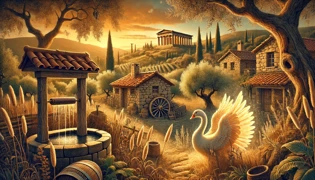
About Story: The Goose That Laid the Golden Eggs: A Timeless Greek Fable is a Fable from greece set in the Ancient. This Descriptive tale explores themes of Wisdom and is suitable for All Ages. It offers Moral insights. A stirring tale of greed, patience, and the wisdom of living in harmony with nature.
Introduction
In the gentle embrace of a warm Aegean sun, the rugged hills of ancient Greece cradled a small, weathered village where time seemed to languish like a slow, reverent hymn. Olive groves whispered secrets to the light summer breeze, and distant columns of ruined temples bore silent witness to stories of the past. Here, among the fields where golden wheat swayed in rhythm with the wind, lived a humble farmer named Theodoros. His days were spent tending to the earth and nurturing a modest flock of animals, a life defined by hard work and simple joys. Yet beneath this serenity lurked a subtle promise, a mysterious twist of fate that would soon color his world in hues of wonder and caution.
Every morning, Theodoros would rise before dawn, his heart light with the hope of a new day. The villagers, too, went about their daily rituals with a quiet dignity, rooted in the traditions passed down through generations. The sun, peeking over the craggy mountains, cast long shadows across the dusty paths leading to the modest homes built of stone and timber, evoking the art of a master painter. In these moments, the world appeared ripe with possibility—a pristine canvas waiting to be painted with the sweet colors of life.
As Theodoros worked in his small field, a strange glimmer caught his eye near the ancient well that stood as a relic of bygone eras. There, amid the tall, whispering reeds, was a creature unlike any he had seen before: a goose with feathers of unearthly luster, its plumage reflecting the soft luminescence of a long-forgotten myth. The creature moved with an almost regal air, and nestled in its downy breast lay the secret that was about to change Theodoros’ destiny forever. It was not merely its beauty, but the quiet dignity in every measured step, hinting at promises and perils intertwined in a delicate dance.
In that early hour, as the village still slumbered and the air hummed with the gentle chirping of cicadas, the stage was set. The slow rhythm of tradition and nature was about to encounter the untamed impulse of human desire—a meeting that would shed light on the dangers of unchecked greed and reveal the hidden rewards of patience and virtue.
The Discovery of a Miracle
The days that followed were imbued with an aura of enchantment. Theodoros, whose modest life had revolved around soil and seed, now found himself contending with the weight of an extraordinary secret. One misty morning, as the tendrils of dawn stretched over the azure sky, he discovered that the magnificent goose had laid an egg of pure gold. The egg lay nestled in a bed of soft straw, its surface gleaming with an almost hypnotic brilliance—a brilliant counterpoint to the earthen tones of his simple abode. News of the miracle reached the ears of his neighbors, who whispered in awe about the celestial nature of this wonder.
The villagers gathered on a worn stone path beneath the ancient cypress trees, their voices low and animated as they speculated about the divine origins of the curious creature. Some claimed it was a blessing from Athena herself, while others believed it to be an omen of prosperity. Amid the murmurs, Theodoros felt a profound mixture of humility and disbelief. His hands, calloused by years of toil, trembled as he cradled the golden egg—a symbol of nature’s hidden grace and the potential for unexpected fortune.
Word of the miraculous egg spread like wildfire, reaching the ears of distant merchants and noblemen. Yet, amid the excitement and the flurry of admiration, Theodoros was cautioned by the elders of the village: a treasure so rare was as delicate as the wings of a moth, and its value lay not in the lustrous metal but in the lesson it carried. The farmer found himself standing at a crossroads of temptation and duty. One part of him yearned to succumb to the opulence that glittered so enticingly before his eyes, while another warned him of the hubris that often accompanies sudden wealth.
Under the deep blue skies and with the gentle hum of cicadas accompanying his solitude, Theodoros wrestled with inner demons that had long been dormant. In the quiet of his modest courtyard, among the fading echoes of ancient hymns and the rustle of olive branches, he pondered the true cost of desire. As the golden egg lay silent on a worn wooden table, it seemed to murmur secrets of both splendor and sorrow. The allure of wealth, he realized, was double-edged—a promise that might bring both joy and inexorable ruin.
There in that reflective silence, the beauty of the moment was not lost on him. The egg, shimmering with the light of endless possibility, was a token that should be revered, not exploited. The gods, it seemed, had entrusted him with a piece of their eternal magic, a reminder that some gifts were not meant to be hoarded, but rather respected and cherished as part of the grand tapestry of life.
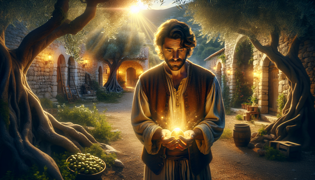
Seeds of Greed and the Waning of Patience
As days turned into weeks, the miraculous goose continued to provide, each morning gifting Theodoros with an egg that shone like liquid sunlight. The once modest farm began to flourish under the unexpected boon, and slowly the scales of fortune tiptoed into realms of luxury previously unknown. Whispers of prosperity circled through the village like a persistent wind. Yet with prosperity came a shadow—a darkening desire that spread like ivy over Theodoros' heart.
The farmer’s humble spirit was gradually eclipsed by a longing for ever greater wealth. The once gentle smile on his weathered face gradually hardened into a mask of avarice. Late at night, by the flicker of oil lamps in his drafty stone home, he began to plot. A cunning plan took shape in his mind, one fraught with dangerous ambition. Every golden egg, once seen as a humble gift from the gods, was now a stepping stone towards unimaginable riches. The cautionary tales of old, recounted in hushed tones under starry skies, began to fade in his mind.
In his feverish contemplation, Theodoros veered away from gratitude and learned the art of covetous calculation. He started to hoard the eggs, secretively depositing them in a hidden alcove beneath a forgotten shrine. The shrine, dedicated to a nameless deity, was draped in the soft shadows of marble and moss—a silent spectator to his moral descent. Beneath its cool, weathered surfaces, the golden tokens accumulated, each one a testament to greed’s corrosive power.
But as his wealth grew, so too did an insidious emptiness. The once vibrant rhythms of nature that had once buoyed his spirit began to sound like a mournful dirge. The chirping of birds, the rustle of the olive branches in the dusky afternoon, even the gentle lapping of the village spring, now seemed to echo his inner disquiet. Neighbors, once warm in their greetings, now exchanged furtive glances and whispered accusations of shame. The subtle transformation in Theodoros's demeanor had not gone unnoticed. The very air of the village, once alight with communal joy, took on a brittle quality, as if burdened by the weight of unspoken regrets.
One fateful evening, as the twilight deepened and shadows lengthened over narrow, winding alleys, Theodoros awoke from a troubled sleep to the sound of quiet clattering. In the fading light, he discovered that the goose, his once-beautiful angel of fortune, was stirring uneasily in her modest pen. The animal’s eyes, deep pools of ancient wisdom, met his with a sorrowful gaze. In that brief moment, a silent rebuke passed between them—a reminder of nature’s delicate balance and the perils of disturbing its equilibrium. It was as if she, too, mourned the loss of a simpler time when the gift of her golden bounty was received with humility rather than avarice. This encounter marked the beginning of a transformation, as doubt seeped into Theodoros’s mind, and a fragile hope for redemption began to kindle amid the shadows of his greed.
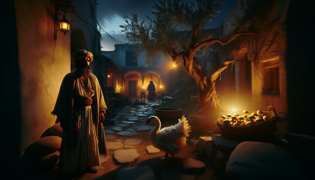
A Crisis and the Inevitable Reckoning
The inevitable day of reckoning had arrived, cloaked in the gloom of a stormy sky that seemed to mirror the turmoil within Theodoros’s heart. As a tempest brewed over the Aegean, the winds howled through the ancient olive groves and battered the stone pathways of the village. The atmosphere, heavy with foreboding, set the stage for an event that would irrevocably alter the course of the farmer’s fate.
That morning, desperate to secure his fortunes beyond the capricious gifts of nature, Theodoros decided to confront the mystery head-on. Driven by the twin impulses of greed and fear, he resolved to lay bare the secret behind the miraculous goose by exploring the hidden confines of the shrine beneath which he had secreted away the golden eggs. In the dim light of his lantern, his footsteps echoed against slick stone as he descended the narrow, winding steps of the ancient sanctum. The air was thick with the smell of damp earth and forgotten incense—a shrine that had silently witnessed centuries of devotion and now, in the gloom of impending calamity, bore witness to human ambition gone awry.
Within the cold, shadowed interior of the shrine, Theodoros’s eyes grew wide with apprehension. The hidden alcove, long neglected and choked with creeping vines, seemed to pulse with a bizarre, unnatural energy. The accumulated eggs, arranged with almost careful precision, radiated an eerie glow that cut through the darkness. In that moment, the golden orbs took on an ominous semblance, as if they were the foci of some ancient, cosmic judgment. The storm outside reached a crescendo, with peals of thunder shaking the very foundations of the shrine. The walls, covered in the faded murals of mythic gods and heroic deeds, appeared to come alive in a frenzy of motion and light.
Overwhelmed by a profound sense of regret and the crushing realization of his folly, Theodoros’s trembling hands reached out to touch one of the golden eggs. In that instant, a flash of divine retribution seemed to pass through the chamber. A resounding crack echoed like a long-forgotten oracle’s decree, and the fragile shell splintered into a thousand shimmering fragments. For a moment, time suspended—the very heartbeat of the world echoing with sorrow. It was as if nature itself had risen in protest, unveiling the truth that unchecked greed and hasty ambition would only bring ruin. The golden essence, that had once symbolized boundless potential, now scattered like fallen stars onto cold, unforgiving stone.
In that visceral moment of collapse, Theodoros finally understood the immutable law of nature and human destiny: that the pursuit of wealth for its own sake, divorced from gratitude and humility, was a path paved with inevitable heartbreak. The storm outside raged on, a turbulent mirror to the tumult inside him, as he fell to his knees, overcome with despair and remorse.
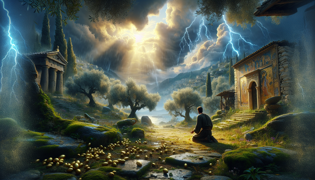
The Dawn of Resolution and Lasting Wisdom
When the anger of the storm finally subsided, its echoes receded into the gentle hues of an emerging dawn, and Theodoros found himself alone in the silent aftermath of his own undoing. The once resplendent shrine now lay cloaked in a fragile mist, its secrets laid bare for a single, unyielding truth: the price of greed was steep, and the treasures of the earth could not be wrenched from the natural order without dire consequence.
In the quiet hours following the tempest, as the first rays of sunlight filtered softly through the scattered remains of shattered eggs and broken dreams, Theodoros began to understand that true wealth was measured not by glittering precious metals, but by the harmony between man and nature. With tear-stained cheeks and a heart heavy with remorse, he emerged from the dark sanctuary of his hidden alcove to face a village that had learned harsh lessons of its own. His neighbors, once blinded by the allure of easy riches, now gathered to offer comfort, their eyes reflecting both compassion and the shared scars of collective folly.
In the days that followed, a slow and steady transformation swept over the community. Theodoros, now humbled by his experiences, resolved to restore what had been lost—to mend the bonds of trust and to revive the ancient traditions of gratitude and respect. The once silent goose, as if touched by the gentle hand of fate, returned to her familiar pen. No longer did she lay eggs in abundance as an object of avarice, but as a reminder of the quiet magic woven into the fabric of everyday existence. Her presence came to signify the delicate balance between receiving and giving, between the fleeting allure of material gain and the enduring worth of inner peace.
Under a sky that had traded its turbulent anger for a mellow, pastel glow, the village began its slow climb toward renewal. Theodoros, in offering apologies and seeking forgiveness, rediscovered the simple joys of life—a shared meal beneath a canopy of blossoming fig trees, the laughter of children playing amidst ancient ruins, and the soft murmur of the Aegean sea at twilight. In the wake of disaster, wisdom had sprouted from the fertile soil of regret. The lesson was as old as the hills: that the virtues of patience, humility, and respect for nature were the only true treasures a man could claim.
In his final moments of quiet reflection, Theodoros pledged to honor the memory of his errors by living a life of deliberate gratitude, ensuring that each golden sunrise served as a constant reminder that the natural world’s gifts were sacred, not commodities to be hoarded. As the village awakened fully to this lesson, the story of the golden egg and its tragic end became woven into the tapestry of local lore—a timeless legend that cautioned future generations against the seductive call of greed and extolled the serene power of patience and wisdom.
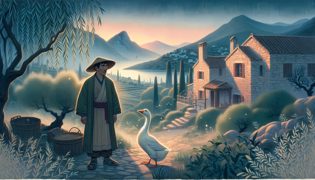
Conclusion
In the final reckoning of fate and human frailty, the tale of Theodoros and his miraculous goose resonated across the rugged hills and weathered cobblestone streets of ancient Greece. In quiet conversations around flickering hearth fires and beneath starlit skies, the villagers recounted how a simple act of nature had transformed one man’s life and, by extension, the collective spirit of a community.
The story did not merely serve as a chronicle of lost fortunes and shattered dreams; it was a timeless reminder of the delicate equilibrium between ambition and gratitude. The ill-fated attempt to harness the boundless potential of nature for selfish gain had erased the very essence of what made the village thrive—the humble appreciation of the everyday gifts bestowed by the earth.
In the lingering echoes of that stormy night, Theodoros found a form of redemption. With a heavy heart yet a soul slowly healing from its wounds, he rededicated himself to the ancient rhythms of the land. No longer swayed by the seductive call of easy wealth, he embraced a life of measured hope and patient toil. His transformation, though born of regret, illuminated a crucial truth: that the true riches in life were found in the art of waiting, in the quiet moments when nature spoke its gentle wisdom to those who were willing to listen.
As the seasons turned and the scars of greed faded into memory, the legend of the goose that laid the golden eggs was etched into the minds of those who sought to live in harmony with the world. The fable, passed down from one generation to the next, carried with it the enduring lesson that the pursuit of fortune should never come at the expense of one's soul. In every sunrise and every whisper of the wind through the ancient olive trees, the spirit of that lesson persisted—a soft, unyielding reminder that wisdom and patience are the most precious treasures of all.

















